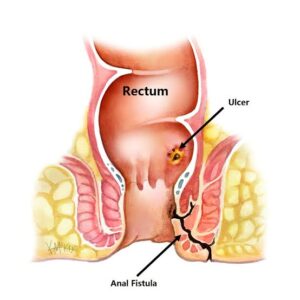Fistula is an abnormal connection or passageway that develops between two organs or vessels that are not normally connected. It can occur in various parts of the body, such as the digestive system, urinary system, or reproductive system
TYPES OF FISTULA
-
- Anal Fistula: A small tunnel that forms between the skin around the anus and the end of the bowel. It is usually caused by an infection or an abscess in the anal gland.
- Vesicovaginal Fistula: A passage that develops between the bladder and vagina, causing urine to leak into the vagina. It can be caused by childbirth injuries, pelvic surgery, or radiation therapy.
- Arteriovenous Fistula: An abnormal connection between an artery and vein, which can cause blood to flow directly from the artery into the vein without passing through the capillaries. It can be congenital or acquired and can occur in various parts of the body.
SYMPTOMS
- Anal Fistula:
- Pain or discomfort around the anus
- Swelling and redness around the anus
- Discharge of pus or blood from the anus
- Itching or irritation around the anus
- Vesicovaginal Fistula:
- Continuous urine leakage from the vagina
- Foul-smelling vaginal discharge
- Pain or discomfort during
- sexual intercourse
- Urinary tract infections
- Arteriovenous Fistula:
- Swelling or bulging of veins
- Palpable thrill or vibration over the affected area
- Warmth and redness around the affected area
- Weakness, numbness or pain in the affected limb
TREATMENT
- Anal Fistula:
- Fistulotomy: a surgical procedure to open the fistula tract and allow it to heal from the inside out.
- Seton placement: a surgical procedure in which a thin piece of material (seton) is placed through the fistula tract to keep it open and prevent recurrence.
- Fibrin glue injection: a minimally invasive procedure in which fibrin glue is injected into the fistula tract to seal it.
- Vesicovaginal Fistula:
- Surgery: A surgical repair may be necessary to close the abnormal passage and restore normal urinary and vaginal function.
- Catheterization: A catheter may be inserted into the bladder to help it heal and prevent urine leakage.
- Arteriovenous Fistula:
- Surgery: A surgical procedure may be necessary to close the abnormal connection and restore normal blood flow.
- Embolization: A minimally invasive procedure in which small particles are injected into the abnormal connection to block the flow of blood and close the fistula.
